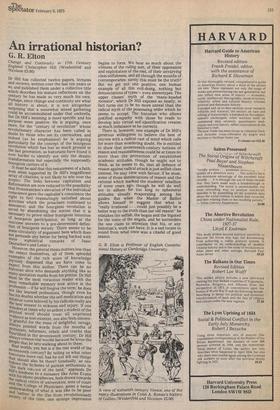An irrational historian?
G. R. Elton
Change and Continuity in 17th Century England Christopher Hill (Weidenfeld and Nicolson £5.00)
Dr Hill has collected twelve papers, lectures and reviews, written over the last ten years or so, and published them under a collective title which describes his mature reflections on the century he has made so very much his own. Perhaps, since change and continuity are what all history is about, it is not altogether surprising that a somewhat mixed gathering could be accommodated under that umbrella, but Dr Hill's meaning is more specific and his purpose more positive. He is arguing, once more, for the "century of revolution" whose revolutionary character has been called in d. oubt by those who see its continuities, and indeed (as he emphasises) he is arguing Particularly for the concept of the bourgeois revolution which has lost so much ground in the last generation, as historians have found it ever harder to identify not only the drastic transformation but especially the supposedly bourgeois carriers of it.
It must be said that this restatement of a faith, even when supported by Dr Hill's magnificent array of citations, is not likely to win over the sceptic. The links between capitalism and Reformation are now reduced to the possibility that Protestantism's elevation of the individual conscience gave the capitalist's conscience the right to feel reassuringly satisfied about activities which the preachers continued to denounce; and the bourgeois revolution is saved by abandoning the notion that it is necessary to prove either bourgeois intention of bourgeois participation, so long as the outcome answers to a pre-determined defini tion of bourgeois society. There seems to be some circularity of argument here which does not persuade any better for being backed with some sophistical remarks of Isaac Deutscher's and Lenin's.
, However, the general thesis matters less than the essays themselves, all of them splendid examples of the rich store of knowledge Joyously dispensed that we have come to expect from this author. There can be no
historian alive who demands anything like so Many quotation marks from his printer. Dr Hill Must be the most voracious reader with the most remarkable memory now active in the
Profession — if he will forgive the term: he does has like learned professions, though even he has his doubts whether the self-medication and amateur cures beloved by his radicals really are the best answer to sickness and injury. If one wo.nders at times why so ardent a student of the PrMted word should treat all unprinted ,evidence as non-existent, one also feels sincerely grateful for the mass of delightful, savage, always pointed words from the mouths of protesters, reformers, rebels and cranks that Rourished in the seventeenth century. Dr Hill always creates real worlds because he loves the People that he sets walking about in them.
Real worlds, yes; but is it the real world of the "everiteenth century? By telling us what other
tphat leave out, has he not left out things at should also be there? Gradually, as one the fo:tunes of puritan enthusiasts in
_he, dark cot s of , the land," applauds Dr s kindness to a nuisance like Arise Evans with his idiotic prophecies, feels drawn towards
the radical critics of universities, inns of court and the College of Physicians, gains a better understanding of what it was like to be poor and• 'unfree' in the (far from revolutionised) society of the time, one strange impression
begins to form. We hear so much about the vileness of the ruling sort, of their oppression and exploitation of the rest, of their unvarying class selfishness, and all through the mouths of contemporaries: surely this must be the truth? But we get not one positive, one human example of all this evil-doing, nothing but denunciations of types even stereotypes. The upper classes' myth of the 'many-headed monster', which Dr Hill exposes so neatly, in fact turns out to be no more unreal than the radical myth of the possessing order which he seems to accept. The historian who allows justified sympathy with those he reads to develop into virtual self-identification creates as much imbalance as he corrects.
There is, however, one example of Dr Hill's generous willingness to believe the best of anyone with a radical cast of mind which calls for more than wondering doubt. He is entitled to show that seventeenth-century notions of reason and reasonableness could be at times no more than the protection of established academic attitudes, though he ought not to think, as he seems to do, that all defence of reason against radical attack is just selfish class interest. He may view with favour, if he must, some of those denunciations of reason and the rational which marked the students' rebellion of some years ago, though he will do well not to adhere for too long to ephemeral attitudes already evaporating among his guides. But when the Master of Balliol allows himself to suggest that what is "really irrational . • . could just possibly be a better way to the truth than our old reason" he mistakes the selfish, the bogus and the bigoted for the voice of the angels, and he surrenders the one claim to attention that his, or any historian's, work can have. It is a sad tocsin to sound from what once was a citadel of good reason.
G. R. Elton is Professor of English Constitutional History at Cambridge University.


































 Previous page
Previous page